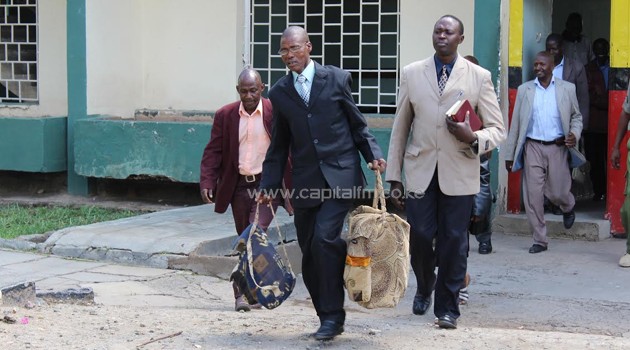Yes, he’d been a man in uniform but for the last 32 years he hasn’t been dressed in military but prison garb.
And after three decades behind bars he has no family to receive him; all he has waiting for him are a handful of good Samaritans from the Seventh Day Adventist Church who helped reform him as he served a jail term for crimes connected to the 1982 attempted coup on former President Daniel Moi’s government.
“I’m glad to finally be in civilian clothes,” he says tagging on the lapels of his suit, “but I’m not wearing a smile because after all this time I have no idea where I’m going.”
And apart from the clothes on his back and the contents of the two patched up bags at his feet – made from fabric used to upholster seats at the prison – Philip Soi has nothing to his name, not even a family.
“I haven’t seen my son since he was one year old and in all my time in prison none of my family members have visited me except for my deceased brother’s son who came for my baptism back in 2011,” he recounts.
A nephew,Pastor Joseph Nyasani of the SDA church hopes, will take Soi in given he has no where else to go:
“I don’t even know where he’ll stay before we ferry him to his nephew’s home in Nakuru and even then we can only hope we’ll get a welcome reception.”
But how does a man end up without a place to call home at the ripe old age of 76?
“This is the Voice of Kenya Nairobi, the time now is 12 minutes past six. You are hereby informed that everybody is requested to stay at home. There should be no movement in town. The government has now been taken over by the military until further notice,” this was the radio announcement that changed the course of Soi’s life.
Soi recalls that he was on guard duties at the home of one of the Kenya Air Force Commanders near Dagoretti corner when the radio announcement was made.
“There were six of us who after hearing the announcement made our way to the Lang’ata barracks for weapons,” he recalled.
And by the time they left the barracks for the city centre, he says, there were 12 of them in two vehicles.
“It was chaotic. There was looting, the police were shooting at us so we decided to hightail it out of there and head back to the Lang’ata barracks. And as we’d been forced to abandon our vehicles due to the road blocks, we decided to cut through the Kibera slum. At that point there were three of us left,” he says.
The official version of events is that when they cut through Kibera, they not only raped women but defiled children; a charge that earned him the last ten years he spent in prison.
“We did not do it. We only passed through the slum because it was the shortest route back to our barracks,” he says.
But once they returned to the barracks, they didn’t find the haven they’d sought.
“We were arrested. Court martialled for discharging over 300 rounds of ammunition and the destruction in the city centre but we only fired because we were being fired at by the police. It was self-defence,” he says.
Innocent or not, the Kenyan government felt that on Friday, Soi had served his time.
“He’s been a model prisoner, one who other prisoners could emulate. So much so that he rose through the ranks to a trustee and he’s grown to a skilled cobbler,” the officer-in-charge of the Athi River prison Bison Madegwa said.
But Soi’s not interested in fixing or making shoes for the remainder of his years. He is instead setting out to reclaim his family.
A tall order given he had to fish around his pockets for a Sh50 note—his only gift from Madegwa for his bus fare back home– and given the strained relations with his wife that preceded his incarceration.
“She left me in 1969; we fell out because she’d left my sick mother alone in the house with our son Shaddrack so she could gossip with the neighbours,” he says.
Without much of a family left however, given his mother died while he was in prison in 1985, his father in 1978 and his surving brother’s whereabouts are unknown to him, he’s keen to make amends.
And he’s adamant that the faith he found behind bars and which has seen him through the last years of his incarceration will carry him through.
“I joined the choir while in prison and while I might no longer be able to sing because of my chest problems, I still hold dear these words, ‘weeping may endure for a night but joy comes in the morning’,” he says as he walks the narrow path of redemption, hymnal in tow.










































